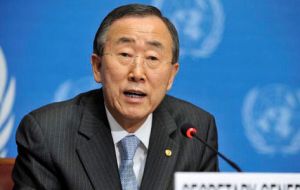MercoPress. South Atlantic News Agency
Ban Ki-moon calls for a more inclusive dialogue on decolonization
 ”Eradication of colonialism, in keeping with the principles of the Charter and the relevant UN resolutions, is our common endeavour” said Ban Ki-moon
”Eradication of colonialism, in keeping with the principles of the Charter and the relevant UN resolutions, is our common endeavour” said Ban Ki-moon With the world undergoing a “great transition,” it is time for a new kind of inclusive dialogue about decolonization, Secretary General Ban Ki-moon said, calling for fresh approaches to resolve the situations of the remaining 16 Non-Self-Governing Territories.
“The risk of movement, while sometimes frightening, is far more preferable to the stagnation of the status quo” Mr. Ban told the Special Committee on Decolonization, as it began its annual program of work at United Nations Headquarters.
The committee, known formally as the Special Committee on the Situation with regard to the Implementation of the Declaration on the Granting of Independence to Colonial Countries and Peoples, was set up two years after the adoption of the Declaration by the General Assembly.
The Declaration affirmed the right of all people to self-determination and proclaimed that colonialism should be brought to a speedy and unconditional end. It states that the subjection of peoples to alien subjugation, domination and exploitation constitutes a denial of fundamental human rights, contravenes the UN Charter and impedes the promotion of world peace and cooperation.
More than 80 former colonies, comprising some 750 million people, have gained independence since the creation of the UN. The 16 remaining Non-Self-Governing Territories are home to nearly two million people.
“The international community is more convinced than ever that colonialism has no place in the modern world,” said Mr. Ban. “The eradication of colonialism, in keeping with the principles of the Charter and the relevant United Nations resolutions, is our common endeavour.”
He said this requires the constructive involvement of all concerned: the Special Committee, the administering Powers and the Non-Self-Governing Territories, working on a case-by-case-basis.
“The Special Committee should be at the forefront in identifying possibilities for change and in promoting priorities in the decolonization process for the benefit of all. As the intergovernmental body exclusively devoted to decolonization, the Special Committee is expected to devise fresh and creative approaches to mobilize the political will to advance its agenda.”
Mr. Ban added that the world is “in a great transition” with many old structures breaking down and new arrangements taking shape.
“In the area of decolonization, 16 Non-Self-Governing Territories require our attention,” he stated. “As we look ahead, the narrative cannot again be portrayed as ‘decolonization deferred’. We no longer have the luxury of indulging in rhetoric and rituals. Concrete action and tangible results are essential.”
The 16 Non-Self-Governing Territories are Gibraltar, New Caledonia, Western Sahara, American Samoa, Anguilla, Bermuda, British Virgin Islands, Cayman Islands, Guam, Montserrat, Pitcairn, Saint Helena, Turks and Caicos Islands, United States Virgin Islands, Tokelau, and the Falkland Islands.




Top Comments
Disclaimer & comment rules-

-

-

Read all comments”.... the 16 Non-Self-Governing Territories are ....................................... .................................................. and the Islas Malvinas (Argentin).. .. ”
Mar 01st, 2013 - 02:52 am 0Do you two understand the meaning of the word inclusive?
Mar 01st, 2013 - 03:47 am 0“The international community is more convinced than ever that colonialism has no place in the modern world,”
Mar 01st, 2013 - 04:45 am 0That's right! Go back to your beloved Britain and return Malvinas to Argentina.
Commenting for this story is now closed.
If you have a Facebook account, become a fan and comment on our Facebook Page!